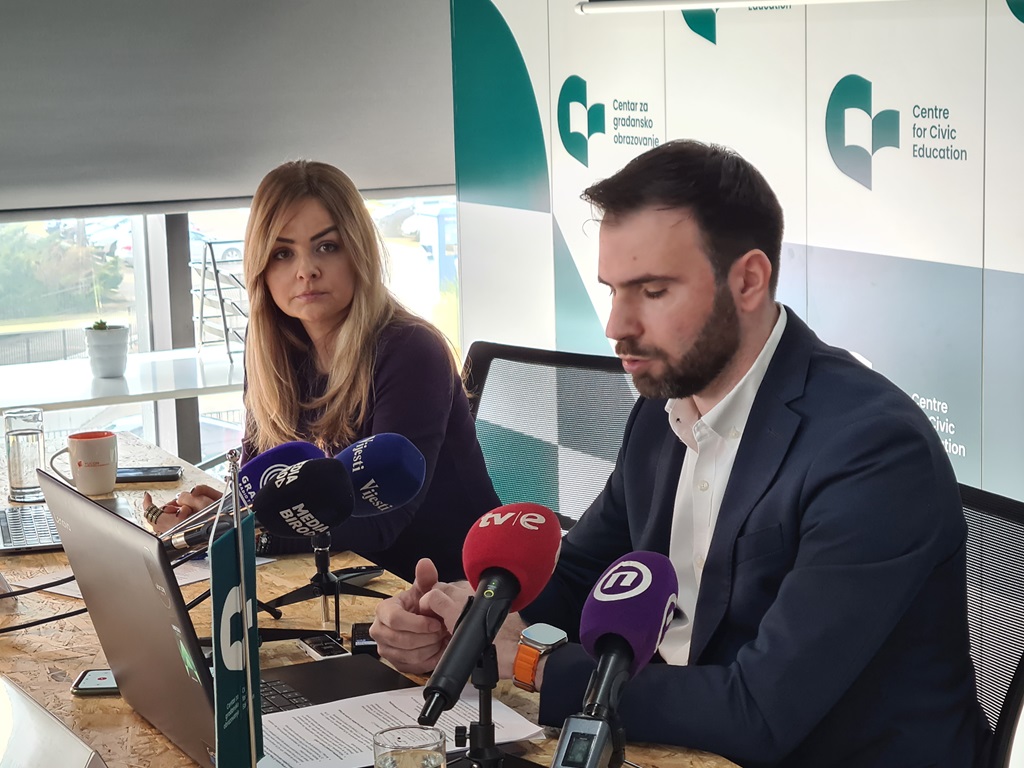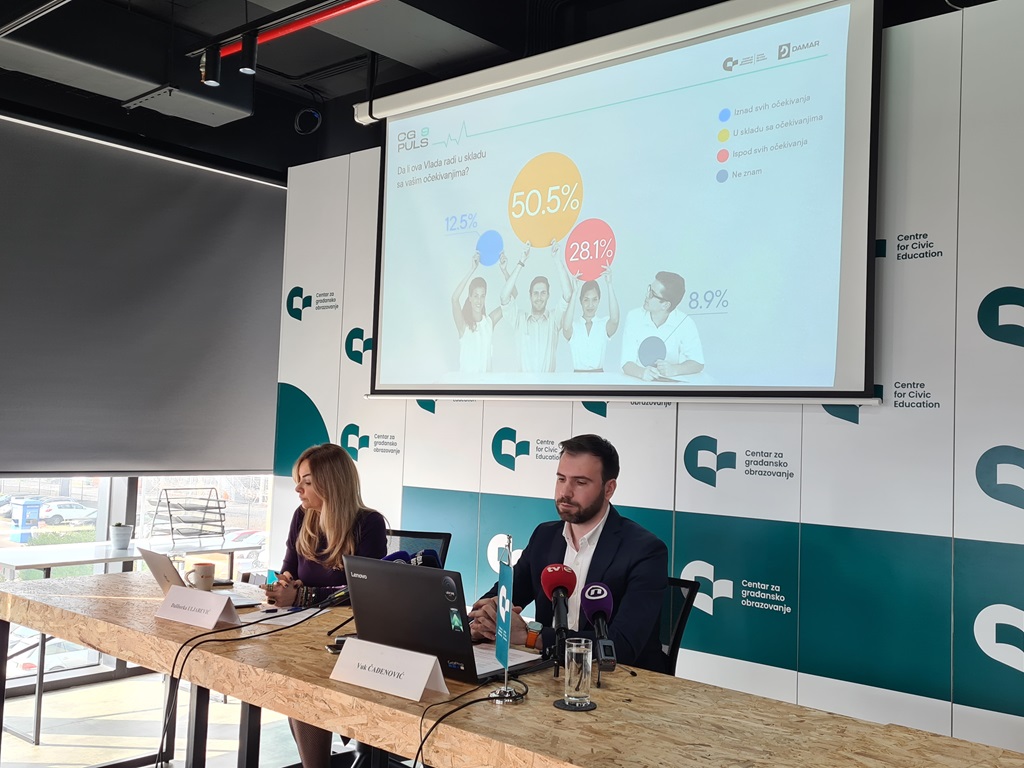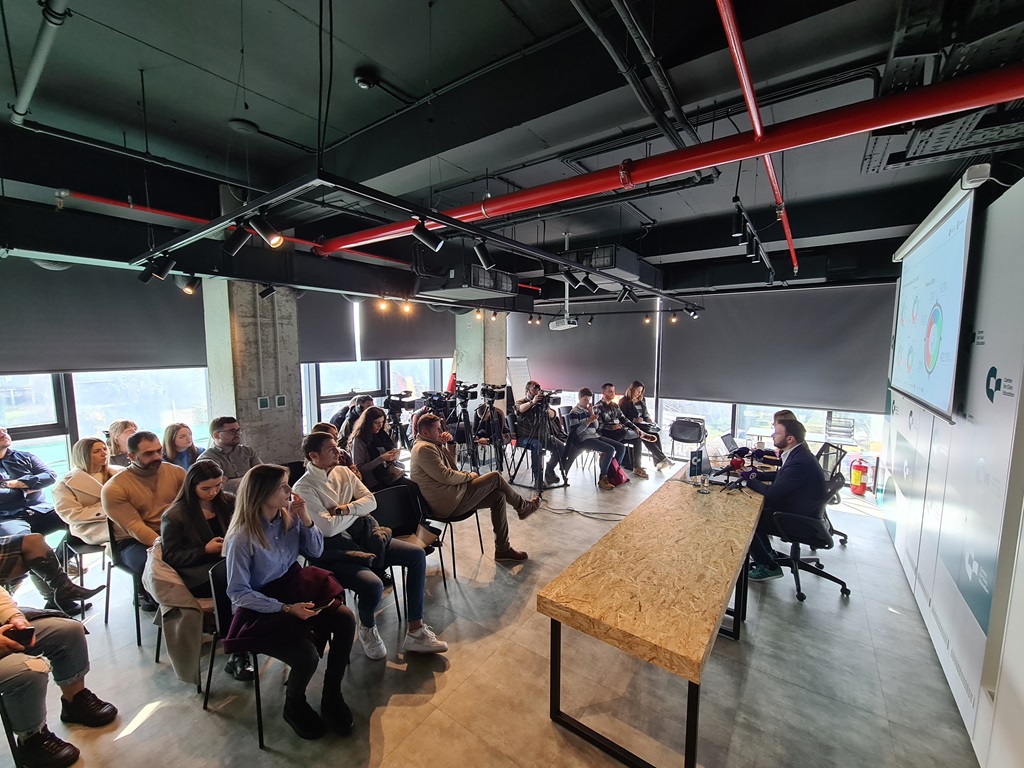There is a growing cautious optimism among the citizens of Montenegro that the country is heading in the right direction and that the situation is stabilizing. The performance of the first 100 days of work of Milojko Spajić’s Government is rated 2.7 on a scale of 1 to 5, and through various attributes, this Government is better perceived than the previous two. The belief persists that getting a job or advancing in public administration is predominantly achieved through personal or party connections. There is no majority support for the entry of coalition “For the Future of Montenegro” into the Government, and the perception of significant changes in policies that their entry would bring indicates the perceived fragility of the current Government and its constituents in relation to the “For the Future of Montenegro” coalition. Citizens are clearly not satisfied with the performance of the opposition either, they support the demands of teachers and mid-level medical staff for salary increases, while scepticism grows about the institutions’ ability to act indiscriminately in the prosecution of abuses of all authorities. Opinions are divided on the standard of living, and there is poor awareness of the programme Europe Now 2, as indicated by the key findings of the MNE Pulse presented today, published by Centre for Civic Education (CCE) and DAMAR Institute.
Compared to previous surveys, there is an increase in citizens who are more optimistic and believe that the country is moving in a positive direction, but a significant number still think we are on the wrong path. Also, the number of those perceiving the current situation as stable has multiplied, although there is still a considerable number of individuals concerned about the state of affairs.
“The Government’s performance in the first 100 days, on a scale of 1 to 5, got an average rating of 2.7, which compared to the previous Government, represents a slight increase in satisfaction among citizens. Additionally, 12.5% state that the Government’s performance exceeds their expectations, while the majority (50.5%) believes that the Government is meeting their expectations, and 28.1% think that the Government’s performance is below expectations,” said Vuk Čađenović, Executive Officer of the Damar – Research Institute, presenting the research data.
In the assessment of the perception of the Government’s character through various attributes, the majority sees the Government as reform-oriented, secular, expert, liberal, and reconciliatory, with a slightly lower, but still majority, assessment as strong.
According to the citizens’ opinion, the most significant factors influencing employment or promotion within this Government are kinship, friendship, and similar connections with members of the Government, as well as party membership, followed by nationality, education and experience, and religious affiliation.
A vast majority – 60.4% of citizens – have a negative opinion about the Government’s decision to no longer broadcast sessions live, while around 20% support it, and the same percentage do not have opinion.
“When it comes to trust in Prime Minister Milojko Spajić, the research results show that, in summary, 57.7% of respondents express a certain level of trust in the prime minister, with 16.2% having complete trust and 41.5% having partial trust. In contrast, 32.5% of respondents do not trust the prime minister at all, while an additional 9.7% have no opinion on this matter,” stated Čađenović.
“The agreement of the ruling majority and the prime minister are almost equal as the main influences on the Government’s policy and activities, with 26.7% and 26.5%, respectively. This indicates the perception that both collective agreements within the ruling structure and the individual authority of the prime minister play a central role in shaping policy. The Movement Europe Now (PES) is cited as a factor with significant influence, while other political parties and entities, such as the Democrats, the coalition ‘For the Future of Montenegro,’ and the SNP, have lower percentages, implying that their influence on Government policy is considered limited,” emphasized Čađenović.
“The opinion on the government reconstruction, in terms of the entry of parties forming the ‘For the Future of Montenegro’ coalition, is divided, with a prevailing belief that it will not happen, and a significant number of respondents undecided on this matter. As expected, above the average framework, this coalition believes that it will happen and of the parties that are currently in the government, this is the above-average position of the SNP and Democrats, while the other constituents of the Government believe less in that scenario,” said Daliborka Uljarević, Executive Director of CCE, commenting on that part of the research.
“Support for the entry of the ‘For the Future of Montenegro’ coalition is given by less than 30% of citizens, predominantly from the voters of this coalition, SNP and Democrats. About 53.3% of respondents believe that such a Government reconstruction would lead to changes in internal or external policies, or both, while about a quarter holds the opposite view, and just over one-fifth cannot assess. This also indicates the perception of the fragility of the current Government’s policies and its constituents in relation to the ‘For the Future of Montenegro’ coalition,” Uljarević specified.
This MNE Pulse also monitored the perception of the parliamentary opposition’s actions. “Citizens are evidently not satisfied with the work of the opposition, even the parties that perform the best are at the level of a modest 2, with the fact that many of their supporters rate them higher than the general average. However, this also means that their supporters expect more effective action,” Uljarević stated.
Demands for an increase in the salaries of education workers have dominant support (56.3%), while just over a third (35.2%) have opposite opinion. There is a divided opinion on who is responsible for the poor results of our students in PISA assessment, but the prevailing view is that it is the responsibility of all actors – teachers, students, parents, and the overall education system.
“A majority of 55.7% still believe that religious education has no place in our formal education system. Compared to the same question from October 2021, there is a slight decrease in that majority and a slight increase among those who believe that religious education should be introduced in schools. Significant differences in attitudes regarding this issue are noted through the level of education, national identity and party preferences. However, it is encouraging that, despite everything, a strong majority remains committed to protecting the civic character of society, which is an important aspect in this context,” emphasized Uljarević.
The majority of citizens consider the demand from mid-level health workers for higher salaries justified (52.9%), but there is also a significant number of those who see no reason for it – 40%. Less than a third of citizens see improvement in the healthcare services after the increase in doctors’ salaries, while the majority believes that the quality remains the same, or slightly less than a fifth thinks it has worsened.
Regarding the rule of law, the trend of trust in the Special State Prosecutor (SSP) and the actions of institutions processing abuses was measured. “The number of those who believe there are no untouchables for the SSP has increased, but there are also those who think otherwise, believing it depends on politicians, i.e., that he initiates proceedings only against certain individuals, namely those with diminishing power even within their own parties. Overall, this indicates that trust in him is currently in a phase of stagnation,” said Uljarević.
Concerning the overall approach of institutions to prosecuting abuses by those in power, the belief that only those abuses from the period of DPS authorities are being processed is growing – 37.2%, and the perception that there is a selective approach, i.e., both sides of abuses are being prosecuted, is declining to 34.4%. The number of respondents undecided on this issue has significantly decreased, and the percentage of those who believe that abuses from all in power are being prosecuted has increased – 14.2% now compared to 6.5% before, but it is still a small percentage compared to other categories.
Part of the research also covered economic topics, with nearly an equal number of citizens stating that their incomes are either adequate or inadequate to cover monthly expenses – 44.4% say their incomes are sufficient, while 46.5% responded negatively.
“A small percentage – 2.6% of citizens believe they live much better than the previous year, while 26.4% state they live slightly better. Therefore, 29% of citizens in greater or lesser measure live better than the previous year. On the other hand, 14.6% of respondents state they live slightly worse, and 8.7% that they live much worse, making up over 23% of citizens who feel a decline in their standard of living. However, the majority, at 47.7%, believes that their standard is unchanged compared to the previous year,” explained Vuk Čađenović.
“The results show division among citizens regarding the Government’s decision to increase minimum pensions to 450 EUR. It seems that the number of those who support or oppose this decision is almost equal – 47.2% support and 46% oppose,” said Čađenović.
In terms of citizens’ awareness of the programme Europe Now 2, less than a fifth claim to be fully informed, while a significantly higher percentage (43.6%) state that they are partially informed, and almost two-fifths (37.5%) claim that they are not informed about this programme. Consequently, 38.3% of respondents do not believe that the Government will implement this program, while 35.9% believe that the Government will successfully implement the programme Europe Now 2, while over a quarter (25.7%) cannot assess whether the government will implement the programme Europe Now 2.
The research was conducted from 22 to 30 January 2024, with application of CAPI method on a three-stage stratified random sample that consisted of 1004 Montenegrin citizens.
MNE Pulse is a joint initiative of CCE and DAMAR agency aimed at providing empirical data to help those involved in strategic democratic shaping of society make decisions based on reliable data and fundamental analyses, with a focus on citizens. This approach can enhance the quality of public debate on important issues and raise the level of accountability for all stakeholders involved.
Maja Marinović, Programme associate



